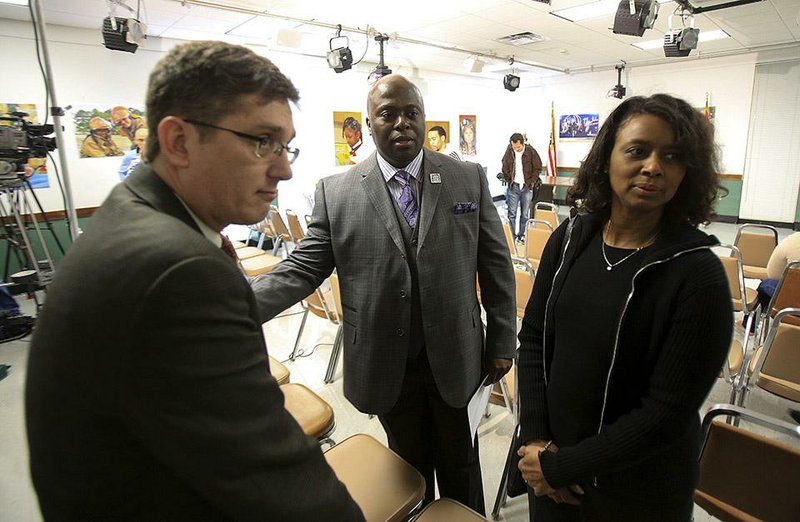On the first morning of a new era in the Little Rock School District, interim Superintendent Dexter Suggs said change is coming to Arkansas' largest school system, which is now operating under state control.
Document set
Little Rock School District state takeover
- State response to lawsuit challenging takeover of LRSD
- LRSD answer to lawsuit challenging state takeover
- Attorney general brief in support of motion to dismiss
- State's arguments to Supreme Court
- Suggs' settlement and severance agreement with LRSD
- Judge Griffen's ruling
- Hearing schedule
- Wendell Griffen's response
- Recusal letter
- Amended Little Rock School District lawsuit
- Little Rock School District lawsuit
- Letter to the Arkansas Department of Education
- A letter from Little Rock School Board member Joy Springer
- Little Rock School District Report
- Ross' response to Fisken's letter
- Fisken letter
- Arkansas Department of Education report
"For our students, today is no different than it was yesterday or any other day for that matter," Suggs said at a late-morning news conference attended by about 50 employees and community members as well as Joy Springer and Jim Ross, who are two of the seven newly displaced School Board members.
"But let me assure you that the Arkansas Department of Education is hard at work developing new plans for academic instruction, helping us to define our new direction and implement proven strategies. Does that mean change will soon be coming? Yes, it does. What the change will look like, at this particular time, I'm not sure."
The Arkansas Board of Education on Wednesday voted 5-4 to remove the locally elected, seven-member Little Rock School Board and make Suggs the superintendent on an interim basis and answerable to Arkansas Education Commissioner Tony Wood. Suggs has been the district's superintendent since July 2013.
Gov. Asa Hutchinson on Thursday said that he and his office will now have a part in changing the district.
"While I was not involved with the Department of Education's review, I respect their decision," Hutchinson said through his spokesman. "I want to reiterate that we will fulfill our mandate under the state Constitution to work as hard as we can to make sure that each student in the Little Rock School District gets a good education. We will work with the state Department of Education and Superintendent Dexter Suggs to achieve the best results for the students. They should come first."
Suggs on Thursday began his remarks thanking the nine people who served on the School Board at different times since his arrival in Little Rock, and said he hoped that they will all remain active in the community and particularly in the school district.
"Words cannot express my gratitude for them," he said.
The people now removed from their elected, unpaid terms of office were School Board President Greg Adams, who was in the midst of his second, three-year term; Dianne Curry, who has been on the board since 2006; and Leslie Fisken, Tara Shephard, C.E. McAdoo, Springer and Ross, who are all in their first terms.
Springer, just elected in September, objected to the takeover, saying that the state board's reasons for it "are not legitimate," as the School Board with its new members was not dysfunctional and had not hindered efforts to improve achievement at the six schools that were targeted because of lagging performance. She said she is exploring a possible legal challenge to the state action.
The state Education Board's vote to take control of the 48-school Little Rock district was based on the six schools being labeled as academically distressed. That designation means fewer than 50 percent of their students scored at proficient levels on math and literacy exams over a three-year period.
The state Board of Education classified Baseline Elementary, Cloverdale and Henderson middle schools, and J.A. Fair, Hall and McClellan high schools as academically distressed last June.
In response, the Little Rock School Board initiated a meeting with the state Education Board's Academic Distress Committee in October to present the district's plan for raising achievement at the schools. The committee scheduled a follow-up meeting for January. That Jan. 7 committee meeting was followed by a Jan. 8 state Education Board vote to meet Wednesday on whether to act against the district.
Suggs said the takeover means that the governance and administration of the district is now the responsibility of the Department of Education.
In addition to telling parents that the schools are operating as normal for the 24,800 students, Suggs addressed teachers, thanking them for their work.
"You are the foundation of any school district. It is critical that we provide the resources that you need in order to do your jobs, in order for you to excel as a professional educator and in order for you to provide 21st-century education to all our students," he said.
The changes that come to the district as the result of the takeover will start in the classroom with the assignment of "a good-to-great teacher" in every classroom, he said, adding later "that reform has to come from the inside out to be sustained."
He said that the district will continue to negotiate with employees unions, which includes teacher members.
Leaders of Little Rock Education Association union are monitoring the state takeover. Representatives of the association attended Suggs' news conference Thursday, and the organization held a private meeting Thursday night.
Asked if any employees in the district are at risk of losing jobs, Suggs said that in his initial talk with Wood, the two didn't talk about employees.
"Everything basically stays as it was for now," Suggs said but added later that reconstituting the staffs at the six academically distressed schools is a possibility. That would mean vacating all the jobs at a school and taking applications from current employees and others to fill them, with the understanding that not all current employees would be rehired at the schools.
"The only job that changed was my job," Suggs said about the state Education Board action. "I went from a full-time superintendent to an interim superintendent."
He said his salary has not been changed.
Asked how long he will remain as superintendent, Suggs said, "I have 18 more years if it is up to me." Suggs said that when he was hired, he wanted to lead the district for 20 years.
The Little Rock School Board last fall extended Suggs' contract by one year to give him a three-year contract. He said he had not received any direction from state officials about his tenure.
"I'm not concerned about what tomorrow may bring," he said. "I'm concerned about what we do today to ensure that we provide the best opportunity for Little Rock students."
He said the district will get "110 percent" from him for however long he is in the job.
Suggs also said Thursday that efforts to improve school facilities -- including the construction of new schools in southwest and west Little Rock -- will go forward.
"Unless I'm told differently we are still going to be very aggressive in doing the things we promised to this community," Suggs said. "We need another middle school. We need a high school. We need quality facilities," he said, adding that he was embarrassed by a lack of air conditioning and the poor quality of dressing rooms in the athletic facilities, and torn, nonworking curtains and poor lighting in auditoriums.
The School Board last week approved a list of building priorities affecting every campus in the district and costing as much as $370 million. The plan called in part for building a replacement campus for McClellan High in southwest Little Rock and converting the existing McClellan campus into a new Cloverdale Middle School campus. The two schools are on the academically distressed list. The board made a new McClellan the top priority but decided that a middle school in northwest Little Rock could be built simultaneously.
Suggs suggested Thursday that while he would like to see the new campuses started at the same time, he wouldn't want to delay the completion of the middle school to wait on the larger high school building.
The School Board anticipated asking voters for a property-tax increase at an election to be held by February 2016. The size of the tax increase was not specified, as the board wanted to consult with citizens advisory committees on a proposed tax.
Suggs also said the state-controlled district will continue work to redesign of the academic program at Hall High, another of the academically distressed schools.
A committee of district employees and community members has been meeting regularly to determine what programs would be continued, enhanced and added at Hall to raise student achievement and make the school more attractive to students. One of the Hall programs to be enhanced, Suggs said Thursday, is its Newcomer Center, which provides services to non-native English-speaking students.
Later Thursday, Suggs and Wood met again to establish a process for communications between the district and the state agency, said Arkansas Department of Education spokesman Kimberly Friedman. There also was an initial discussion on the academically distressed schools. The district's budget, its facilities plan and its public outreach through town hall-type meetings were also discussed, Friedman said.
"This was the first day after the state board's decision, so the meeting allowed Mr. Wood and Dr. Suggs to get to know each other and discuss some of the future work they will be doing together," she said.
State Education Board Chairman Sam Ledbetter said Thursday that he had received "a few calls and a few emails" about the takeover and most had been encouraging. He had received "one or two" negative emails but most were civil.
"The main thing, I think, there was a lot of misinformation spread about what a state takeover would look like and what that would mean immediately," he said, referring to rumors, including ones about eliminating extracurricular activities.
"I think there was some apprehension among some of the patrons. I really believe changes will not be as sudden and dramatic as some had suggested."
The hope, he added, is for steady progress toward improvement.
Education Board member Jay Barth said Thursday that in the short run, the district will continue business as usual.
But the real question is: "What will it look like in six months? Next year? And the year after?" Barth added.
"That's a wonderful question," he said. "We don't know what will happen there. I don't have any crystal balls. A plan will unquestionably develop, but it's certainly not there today."
High school students from district schools have participated in the discussions about the district, first at a community forum on Monday and at the state Education Board meeting Wednesday. On Thursday night a group of 100 or more students gathered in front of the state Capitol to show support for the district.
Information for the story was contributed by Michael R. Wickline of the Arkansas Democrat-Gazette.
A section on 01/30/2015

